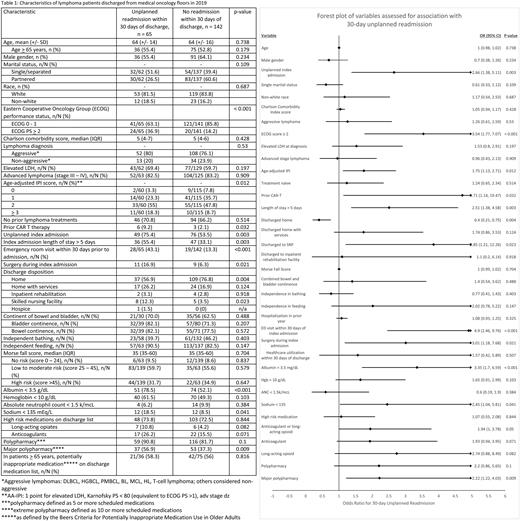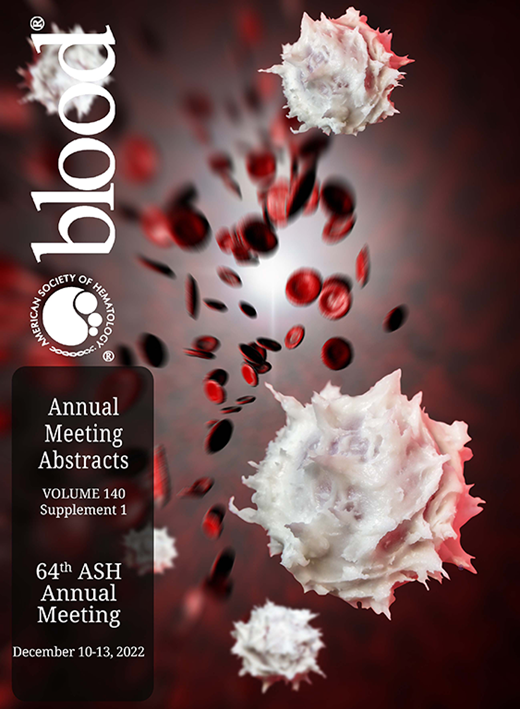Abstract
Background: Patients with lymphoma frequently experience hospital readmissions. Yet, limited data exist describing hospital readmissions in the lymphoma population. In this study, we sought to identify additional patient-specific characteristics associated with unplanned readmissions in patients with lymphoma at our institution.
Methods: We conducted a retrospective, single-center study of patients with lymphoma who were age >18 and discharged from medical oncology wards from January-December 2019 (index admission). We categorized patients as having high-risk medications per the Institute for Safe Medication Practices, potentially inappropriate medications (PIMs) for older patients (age 65+) per the American Geriatric Society Beers Criteria, and polypharmacy and major polypharmacy as 5 or more and 10 or more scheduled medications on the discharge medication list, respectively. We performed univariate logistic regression to assess the association of with having an unplanned readmission within 30 days of discharge from index admission. The following factors, selected for clinical relevance, were assessed: age; gender; race; marital status; Charlson comorbidity score; lymphoma diagnosis and related parameters (stage, LDH, prior treatment ECOG PS); index hospitalization reason, duration, discharge disposition and prior healthcare utilization; activities of daily living (ADL) status; Morse fall score; laboratory values at time of discharge; discharge medication list; 30-day readmission status and readmission reason if applicable.
Results: We included 207 patients (mean age 63.9 years, 38.6% female, 83.1% white race, 56.8% partnered), 65 (31.4%) of whom experienced a 30-day unplanned readmission. Patients experiencing a 30-day unplanned readmission were more likely to have ECOG PS >2 (36.9% vs 14.2%, p<0.001), higher age-adjusted IPI score (score 0, 3.3% vs 7.8%; score 1, 23.3% vs 35.7%; score 2, 55.0% vs 47.8%; score > 3, 18.3% vs 8.7%; p=0.012), received CAR T-cell therapy (9.2% vs 2.1%, p=0.032), index length of stay >5 days (55.4% vs 33.1%, p=0.003), been discharged to a skilled nursing facility (12.3% vs 3.5%, p=0.023), albumin <3.5 g/dL (78.5% vs 52.1%, p<0.001), and sodium <135 mEq/L (18.5% vs 8.5%, p=0.041). Patients discharged home were less likely to have a 30-day unplanned readmission (56.9% vs 76.8%, p=0.004). Age, sex, marital status, Charlson comorbidity score, aggressive versus non-aggressive lymphoma diagnosis, prior lymphoma treatment, discharge home with services or to inpatient rehabilitation, Morse fall score, bowel and/or bladder continence, independence in feeding or bathing, neutropenia (ANC<1.5 k/mcL), and Hgb <10 g/dL were not significantly associated with increased likelihood for unplanned readmission.
Among medication-related factors, we found that patients with major polypharmacy on the index admission discharge medication list had a higher likelihood for unplanned readmission (56.9% vs 37.3%, p=0.009). Patients with discharge medication lists with polypharmacy (90.8% vs 81.7%, 00, long-acting opiates (10.8% vs 4.2%, p=0.082), and/or anticoagulants (26.2% vs 15.5%, p=0.071) had a higher likelihood for unplanned readmissions, but these differences did not reach statistical significance. Presence of PIMs was not associated with readmission.
Conclusions: In this relatively large cohort of patients with lymphoma, we identified several risk factors for unplanned hospital readmissions. We found associations among unplanned readmissions and impaired performance status, receipt of prior CAR T therapy, higher age-adjusted IPI score, discharge location (home, skilled nursing facility, etc), lower albumin and sodium levels, as well as major polypharmacy on the discharge medication list. Future directions include further efforts to identify lymphoma patients at high risk for hospital readmissions and developing readmission prevention strategies in those patients.
Disclosures
Lei:TScan Therapeutics: Consultancy; Astrazeneca: Honoraria. Johnson:ADC Therapeutics: Consultancy; Seagen: Consultancy; AstraZeneca: Consultancy.
Author notes
Asterisk with author names denotes non-ASH members.


